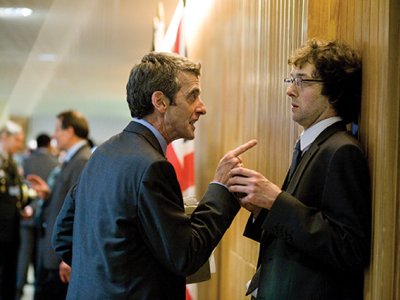
IN THE LOOP
A new satire spoofs a bankrupt political culture. Can we learn anything from the laughter it provokes?
Alastair Campbell famously said ‘we don’t do God’, when a journalist wanted to press Tony Blair on an issue of faith. Armando Iannucci’s vicious, toxically profane and bitterly funny film ‘In the Loop’ (2009) about the political spinning of preparation for war in the Middle East gives a good indication of why God might not get a look in when truth is about the ruthless expression of power.
‘In the Loop’ shares some of the characters and outlook of the award winning TV series ‘The Thick Of It’, most noticeably the bruising amoral force of nature of Scottish spin doctor Malcolm Tucker, based on Alastair Campbell himself and so true to life that Fiona Millar, Campbell’s partner, has said ‘It’s so like him, do you know that? It’s just him!’ Tucker is joined by other identifiable characters, including an American hawk bearing a believable resemblace to Donald Rumsfeld, who uses a live hand grenade as a paper weight in his Washington office. There are weak unprincipled British Ministers and dodgy dossiers floating around and although Iraq is never mentioned, the film represents the first real attempt at serious satire of the most important policy decision of the new century.
It was depressing to read after the screening that politicians have confided in Armando Iannucci that the business of politics is ‘worse...a lot worse than this’. I am not naïve about the political process, but rampant bullying, sexism and contempt for the electorate are features which those who govern should strive to resist.
Public disengagement from the British political process has perhaps three underlying causes. The first is the nature of politics itself. Under successive leaders, the two main parties have fought over the centre ground, leaving many wondering what underlying principles really separate them except that peculiar Westminster tribalism which Freud might have described as the narcissism of minor difference (i.e. the closer you are in outlook, the nastier the fight to establish difference). Party members might baulk at this, but unless they can engage with a genuine perception they will not win people back.
The public have also become disenchanted with politicians. Steadily, over years, confidence and trust in MPs has eroded to a dangerous point. Cash for honours, callous smearing of opponents and the expenses row are the latest in a series of worrying developments at Westminster and the latter an indication that recent abuses are an all-party phenomenon.
Finally, the public should take a look in the mirror, for it has become more apathetic in recent years. The concept of citizenship is being replaced by a model of the voter as consumer, where we have no larger vision than individual satisfaction with the delivery of public services. The public might contend that vast protests like the one staged against the war in Iraq in February 2003 are so high-handedly ignored that indifference must become their only resting place but we should resist despair.
Christian citizenship is predicated on the command to love our neighbours as ourselves. With political rights come civic duties, especially to the more vulnerable members of society. We should speak out more readily on behalf of those who lack a voice than for our own needs, though the command includes a call to love ourselves also. Christians should nevertheless resist the narrowing view of public life as a space where only individual consumer rights are contested and promote the idea of the public good. We may differ over what this looks like, but a commitment to exploring it witnesses to the just and loving character of the God who calls us into community.
‘In the Loop’ is a reminder too of the great challenge faced by Christian politicians from all parties as they seek to bring their faith to bear in complex and often Machiavellian circumstances. It is fashionable to show contempt of politicians; in scripture we are called to pray for them.
POPULAR ARTICLES

Obama's Covert Wars
The use of drones is going to change warfare out of all recognition in the next decades.

Through A Glass Starkly
Images of traumatic incidents caught on mobile phone can be put to remarkable effect.

What Are British Values?
Is there a British identity and if so, what has shaped the values and institutions that form it?


